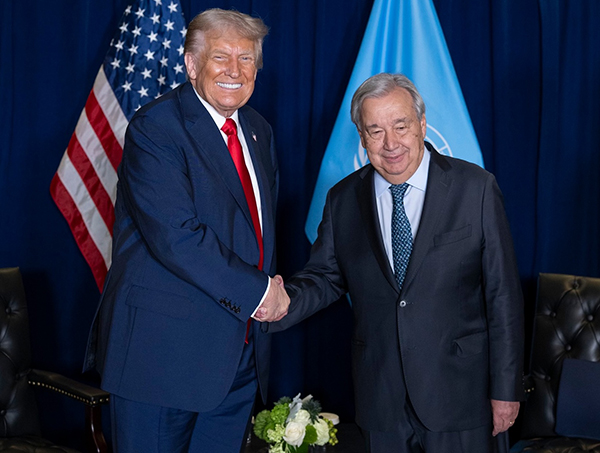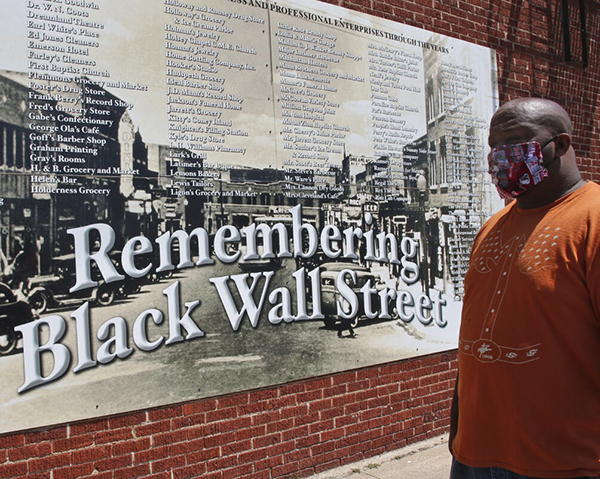THE HUTCHINSON REPORT: Trump doesn’t have an ethics policy, so how can he violate it?

President Donald J. Trump meets with the UN Secretary General Antonio Guterres. Columnist Earl Ofari Hutchinson writes that Trump continues to skirt constitutional limitations on using the presidency to enrich himself and his family.
Courtesy photo
By Earl Ofari Hutchinson
Contributing Columnist
President Donald Trump never uttered the word emoluments.
The Founding Fathers inserted the emoluments clause in the Constitution for one reason and one reason only. They were mindful of the potential of foreign governments exerting undue influence over the policies of the then fledgling U.S.
This is the second of a two-part series on President Donald Trump’s profiteering from the presidency. Excerpted from Earl Ofari Hutchinson’s latest work “Trump for Sale” (Middle Passage Press).
To ensure that didn’t happen the clause barred officeholders from accepting “any present, emolument, office or title of any kind whatever, from any king, prince or foreign state” without congressional approval. Though it broadly named officeholders, the real target was the most powerful officeholder of all, the president.
So, the obvious question besides whether Trump violated the clause by taking gifts such as the Qatari luxury jet or peddling his meme coins, was whether the buyers and the givers of gifts would extract special favors from or influence U.S. policy decisions.
Trump went further to make sure that he would not run afoul of ethics requirements of office holders by dumping any prohibitions about cutting deals with foreign governments or wealthy individuals in other countries. He did not enact or even commit to enact an ethics policy that his administration would adhere to.
It is true that other presidents cut lucrative business deals and profited substantially from their investments. However, there was one significant difference between them and Trump.
They were former presidents. They inked lucrative deals after they left the office. There was no intended or realized influence gain by them in the White House from the companies or individuals that the former presidents cut their deals with.
By the start of Trump’s second term, a slew of wealthy investors, mega corporations, industry groups and — most alarming — foreign governments and super-rich individuals in foreign countries had cut various real estate, investment, branding and merchandise purchasing with the Trump organization. His wife, Melania, his son, and other family members, had also busily cut various deals, development projects and merchandise product purchase deals.
During his first term, public interest groups did more than voice criticisms, they filed lawsuits to rein in Trump and his family’s naked profiteering. In a few cases, their suits were upheld by federal appeals courts. Trump quickly filed his usual appeals. His attorneys argued that the court decisions against him doing business dealings while president were “fundamentally erred in permitting this unprecedented and extraordinary lawsuit to proceed” and called the alleged injury “attenuated and speculative.”
When Trump was booted out of office in January 2021, the Supreme Court, as usual, came to his defense. It declared that the cases were moot and tossed all the rulings against him with no comment.
The cases were more relevant than ever. In his second White House go round the case against him for profiteering and possible violations of the constitutional prohibition against gift taking and play for pay wheeling and dealing was even stronger. By then, Trump’s business and investment empire was growing in leaps and diversity. The holdings that left him wide open to favor trading and influence peddling were his ownership or investments in media and technology, the Trump World Tower, LIV Golf, foreign golf courses and resorts, and $TRUMP Meme Coin.
The list of foreign governments and wealthy investors in foreign countries steadily grew at the start of his second term. They included: Oman, Saudi Arabia, the United Arab Emirates, Iraq, Kuwait, Malaysia, Saudi Arabia, Slovakia, Vietnam and Thailand, Iran, India and Russia. They had cut direct investment and building deals with him for new resorts or golf courses, the purchase of his coins, rentals of luxury condos at his properties and booking golf tournaments at his properties.
One example among many exemplified the ease with which a foreign government could receive and get favors for kicking in millions to his business empire. Saudi Arabia’s royalty rulers splurged on investing in and booking stays at Trump properties. A compelling case could be made that this violated the emoluments clause of the Constitution. One observer was even more specific how it paid off for the Saudi government.
“We also saw Trump making decisions that seemed surprisingly positive toward Saudi Arabia, including essentially looking the other way when Saudi Arabia killed a U.S.-based journalist.”
Deepak Gupta was one of the attorneys that sued Trump during his first term for naked profiteering that ran afoul of the constitutional bar on a president turning the presidency into a personal piggy bank. He was disappointed but not surprised when the Supreme Court essentially gave Trump the green light to continue soaring his empire while in office.
He did, though, see one silver lining.
“I’m proud of the work we did to ensure the Constitution’s anti-corruption norms weren’t forgotten,” Gupta said.
That was true, But in Trump’s case it was never a matter of him forgetting that the Oval Office was a public trust, not a private bank account. He never did or would see any contradiction between the two. He and his presidency would always remain for sale.
Earl Ofari Hutchinson is an author and political analyst. His latest book is “Trump for Sale” (Middle Passage Press).





